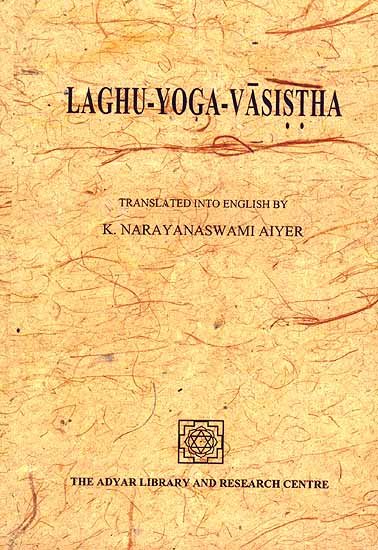Laghu-yoga-vasistha
by K. Narayanasvami Aiyar | 1896 | 137,618 words | ISBN-10: 818514141X | ISBN-13: 9788185141411
This page relates “the story of kaca”, the 10th part of chapter 6 of Laghu-yoga-vasistha (English translation). This ancient Sanskrit book contains epic legendry (similair to puranas and itihasa) and deals with the Advaita-vedanta (non-dual) branch of Indian philosophy. It is authored by sage (rishi) Valmiki and condensed (laghu) from an even larger work, forming a discourse between Vasistha (Vasishtha) and Rama. This part is included in the chapter “nirvana-prakarana”.
Part 10 - The Story of Kaca
Summary. Once gain is illustrated the fact that Chitta-tyāga alone constitutes the renunciation of all.
“In the previous story I have related to thee the story of Śikhidhvaja, the most enlightened of persons. If thou art as ripe as he, thou wilt never be affected by dire pains. Following the same path is the learned Kacha, the son of Bṛhaspati, the Deva-guru.[1] Thou shouldst be acquainted with his story also.”
Rāma asked” “Please throw light upon the path through which Kacha came into direct cognition of the Supreme.”
Vasiṣṭha replied: “Muni Kacha, the son of Bṛhaspati, who had known the substratum of all things through a knowledge of the higher state, approached the Devaguru, his father, for enlightenment upon the best means of releasing the self from the care of mundane existence.”
The Devaguru said: ‘This large expanse of the ocean of births, wherein live the countless hosts of crocodiles, fishes, etc., can be bridged over only by the incomparable power of all-renunciation, involving great troubles and responsibilities.’ At these words of his father, Kacha, renounced all things and, retiring into the forest, lived there for eight years, at the end of which period he was visited by his father. Having accosted his father with due respects, he asked him the reason why in spite of the renunciation of all for about eight years, his mental pains had not subsided. To which his father replied merely that he should give up everything and departed. After the departure of his father, he denied himself even the barks of trees, cloths, etc., which he had on. Thus was he stark naked, like a clear sky in the autumnal season, when the sun, moon, stars, etc., are clearly visible in the skies. Again Kacha met his father and having prostrated himself lovingly before him, laid before him in plaintive tones the fact of his inability to get quiescence of mind, albeit the complete renunciation of all things. Thus did he consult his father who gave him the following advice: ‘It is the opinion of the great that the mind is the all-in-all and that its mastery leads to the renunciation of all. Through such a mental abnegation it is, that thou wilt be able to free thyself from all pains.’ So saying, Bṛhaspati vanished.
Thereupon the resplendent Muni Kacha soliloquized to himself thus: ‘I have been inquiring as to what mind is and have not been able to come to any conclusion. If the body with its parts is different from the mind, then all our efforts to separate them both are useless; for how can the separation take place between the mind and the body, while they are themselves different from one another?’ All his doubts about mind not being resolved, he again applied to his father to aid him in the solution of his doubts.
Bṛhaspati said thus: ‘The wise who have understood what mind is, say that it is no other than Ahaṃkāra (the idea of “I”). The idea of “I” existing within all creatures is the stainful mind.’
Kacha asked: ‘It is indeed difficult to avoid this idea of “I”. How is this adamant to be splintered to pieces?’
Bṛhaspati replied: ‘Pain does not really exist. It is very easy to remove this Ahaṃkāra. Within the time taken in the squeezing of a flower or the twinkling of an eye, this Ahaṃkāra can be easily eradicated. No long dissertation is necessary in this topic. One only Principle is, which is the non-dual, the endless, the supreme Jñāna, the immaculate, the Plenum purer than Ākāśa. Meditate upon it without fluctuation of mind and free thyself from all pain with true calmness of mind. Being quite unreal, Ahaṃkāra will end through efforts. How can Ahaṃkāra grow in the atmosphere of the meditation of the eternal? Can dust arise out of the waters, or waters, out of the fire? Contemplating upon the Eternal, mayest thou be free from the differentiated conceptions of “I”, “he”, etc. Tattva-jñāna is that non-dual one which is subtle, immaculate, the supreme self-light, and the all which is not subject to the forms generated by the quarters, time, etc., and is not obscured or sullied by pains, etc. Mayest thou be in this certitude of Ātmic Reality.’
So Bṛhaspati revealed the highest of mysteries. May you be, Oh Rāma, in that self-same desireless state in which Muni Kacha was, who having abandoned the idea of ‘I’, ‘thou,’ etc., and destroyed all internal attractions, was full of Ātmic meditation as a Jīvanmukta without any Vikalpas in his mind. In Kaivalya (or final liberation), this Ahaṃkāra is nothing but unreal. Therefore do not set your heart upon giving it up or taking it up. Whoever will dream of taking hold of or letting go of the horns of a hare which are unreal?”
Here Rāma asked: “How did there arise in the Plenum of Brahma-jñāna an element foreign to it?” Vasiṣṭha replied: “The emergence of concepts of diversity, which are unreal, results in rebirths; but the realization of the one Reality without any doubts is the emancipation from rebirths.”
Footnotes and references:
[1]:
Bṛhaspati, Jupiter is the Guru or priest of the Devas.
